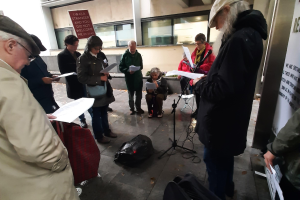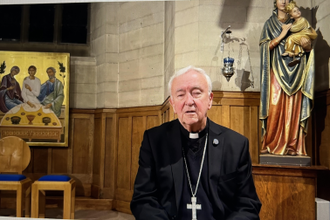Text: Lord Alton voices grave concerns over Immigration Bill

Lord Alton
Lord Alton of Liverpool (CB) made the following speech during the Immigration Bill Second Reading Debate, on 22nd December 2015.
"My Lords, I should like to contrast this Immigration Bill with the Bill which the Home Office laid before us last year on human trafficking and modern-day slavery. That was a well-crafted piece of legislation, which enjoyed bipartisan support and was significantly improved as it made its way through both of our Houses of Parliament.
Ministers were warmly congratulated on the way in which they engaged with complex issues and the organisations working in the field.
I wish that I could say the same for this Bill.
As the Minister knows, last week I chaired a briefing organised by the Refugee Children's Consortium, which comprises some 40 agencies. No one could have left that meeting believing that organisations ranging from Barnardo's and the Children's Society to the Refugee Council, the Office of the Children's Commissioner and the Immigration Law Practitioners' Association were anything other than deeply concerned by the impact which the Bill will have on some already incredibly vulnerable people.
I would draw a further link with the showcase legislation on human trafficking and modern-day slavery.
There is a widely held view, which I share, that the enforced destitution, which has been referred to in this debate and which this legislation sets out to achieve as a misguided way of disincentivising immigrants, will push desperate people into the clutches of traffickers and leave them open to the very exploitation which the 2014 Act set out to deter.
It is sometimes said that when you legislate in haste, you repent at leisure.
I feel very uneasy about a Bill which has all the characteristics of hasty legislation: proposals not fully thought through or developed; inadequate evaluation; and drafting that has been struggling to keep up with the progress of the Bill.
Another tell-tale sign of unseemly haste is the way in which extensions to Scotland, Northern Ireland and, in some cases, Wales are deferred to regulations--a point which the noble Lord, Lord Dubs, alluded to. How can this possibly be a good way of making law?
Nor have we properly evaluated the impact and effect of the Immigration Act 2014 before legislating further.
I refer to issues such as the removal of rights of appeal, the creation of civil penalty schemes for landlords and the dispensing with time-honoured remedies and rights of redress.
So, when we get to Committee and Report, I hope that we will carefully scrutinise in particular Clauses 37 and 38, which are concerned with the destitution of refused asylum seekers.
In a speech which I made in October in support of the noble Baroness, Lady Hamwee, when she sought to annul Asylum Support Regulations, I quoted Asylum Link Merseyside, of which I am a patron and which is based in the heart of the inner-city areas that I represented for 25 years as a city councillor or as a Member of the House of Commons. As I said then, ALM contends that:
"This government policy of making asylum seekers destitute works on the assumption that by forcing people into extreme poverty they will choose to return to countries from which they have fled in fear of their lives".
Its experience has been that 98% of failed asylum seekers choose to stay, surviving on handouts, sleeping on floors or sleeping rough. Over the past three years, it has come into contact, in its words,
"with over 400 destitute asylum seekers out of which only eight have chosen to return home voluntarily".--[Official Report, 27/10/15; col. 1145.]
The Cardinal Hume Centre, a stone's throw away from where we are gathered today, is one of the very few organisations that still provides free immigration advice from application right up to judicial review.
The centre currently has a caseload of more than 300 open cases. From the centre's front-line experience, it warns that using destitution simply does not work. Instead, it leaves people only more reliant on charities and more susceptible to abuse and exploitation.
Paradoxically, the Bill is likely to undermine immigration controls as refused asylum seekers will have little incentive to remain in contact with the authorities once support has been withdrawn.
Statistics released by the Home Office last month revealed that a third of appeals are in fact accepted, so under Part 5 of the Bill there will be individuals and families with children who will eventually be granted asylum, but who by that point will have been starved and abandoned by the British state. How will that help with their integration into society?
The current demonising and scapegoating of migrants should make us think about the society we want to be: do we value these people as sources of economic potential or as human beings?
My late mother came to this country as an immigrant from the west of Ireland. Her first language was Irish, not English, and she and her siblings fled harrowing poverty after the deaths of both their parents.
She met my demobbed father, who was a Desert Rat, and married. She was always grateful for the opportunity to earn a living, make a home and bring up her children.
In my years as a teenage student in Liverpool, there were still advertisements for accommodation that bore the words, "Blacks and Irish need not apply". I also saw how easily people and communities could be stigmatised and discriminated against. All this makes me especially wary of laws which indefinitely detain immigrants and seem to discriminate against them.
I hope that, in Committee, we will correct this injustice, and I entirely agree with the remarks of the noble Lord, Lord Rosser, about indefinite detention.
We should also enable people to have the right to work, perhaps modelled on the American green card system.
How many of us could survive in accommodation, given on a no-choice basis, with just £5.28 each day to cover food, clothing, toiletries, travel, communications and all other necessities? This year, the British Red Cross says that it has supported more than 10,000 asylum seekers and their dependents in that kind of situation. This is not Syria; it is the UK in 2015, where 10,000 people were in receipt of aid from the Red Cross. That is not the hallmark of a compassionate or civilised society.
The Bill also affects family unity. The Universal Declaration of Human Rights insists:
"The family is the natural and fundamental group unit of society and is entitled to protection by society and the State".
The situation of families in Calais was referred to earlier.
There are currently an estimated 6,000 people living in the "jungle" refugee camp in Calais, and the majority of residents are refugees from countries and regions facing the kind of dangers of which we are all too sadly aware.
Caritas Social Action Network recently visited the camp and spoke to young people fleeing terror groups. One young man, just 18, was left with little choice but to leave Iraq after his village was taken under Daesh control. Had he stayed, he would have faced two options: join or be put to death. His brother had already claimed asylum in the UK, and was now living safely in Liverpool, yet the restrictive family reunification rules mean he cannot join him here.
Having experienced such atrocities and loss, is it fair that he would not be able to be reunited with his family in England?
I have recently referred to the camp in Calais on a number of occasions during exchanges in your Lordships' House.
Rob Lawrie, a former soldier, tried to rescue a four year-old girl from the camp because he could not bear to see her remain in the horrific conditions--he now faces five years in prison for doing so.
He concedes that what he did was wrong, but it is hard not to think of the Kindertransport or Sir Nicholas Winton and the rescue of countless children caught up in the horrors of the Third Reich, which bears easy comparison with the depredations of ISIS.
Save the Children say that 10,000 minors and unaccompanied children fled to Europe last year, but 4,000 have disappeared. Into what? The Minister has undertaken to meet Save the Children and I hope he will give us a detailed response on the position of unaccompanied minors and children and what priority they will be given, how local authorities will be co-ordinated to deal with them, what safeguarding will be put in place, and how the amazing generosity and goodness of countless British people will be tapped through nationally organised fostering arrangements.
Finally, as currently drafted, the Bill fails to address the abuse and exploitation that migrant domestic workers face as a consequence of the tied visa system, an issue which I spoke on at each stage of the Modern Slavery Bill, and on which my noble friend Lord Hylton and I divided your Lordships' house. I echo his remarks from earlier.
In response to our debates, the Government asked the barrister James Ewins to carry out a review of the overseas domestic worker visa. Published last week, it covered the right to change employer, extension to two and a half years for such workers, information interviews and refusal of settlement. Mr Ewins says:
"On the balance of the evidence currently available, this review finds that the existence of a tie to a specific employer and the absence of a universal right to change employer and apply for extensions of the visa are incompatible with the reasonable protection of overseas domestic workers while in the UK".
The tied visa system has increased the exploitation and abuse of domestic workers. Reform to the rules is desperately needed and it is vital that we do not miss this opportunity, once again, to rectify this injustice. The report quotes the noble lord, the Minister, as saying:
"Abuse of domestic workers, whether UK or EEA nationals, those on an [overseas domestic workers] or other visa, or those who have entered the UK illegally, is an abhorrent crime and will not be tolerated here in Britain".
Now is our chance to give legislative protection to this group of workers and I look forward to hearing from the Minister what the Government propose to do."


















